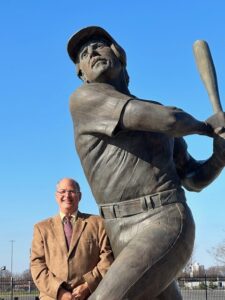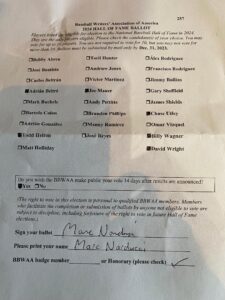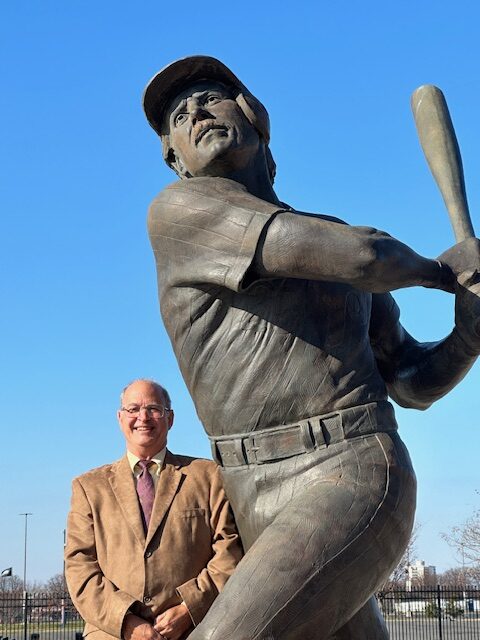Marc Narducci spent 37 years covering all sports for The Philadelphia Inquirer before retiring in July 2021. He covered everything from high school sports to the Phillies winning the World Series and the Eagles winning the Super Bowl. A lifelong southern New Jersey resident, he remains a freelance writer and broadcaster. Once again, Marc reached out to see if MLB Trade Rumors would be interested in publishing his Hall of Fame ballot. I am happy to do it and hope it can be an interesting topic of debate for our readers. Here’s Marc…
This was an extremely difficult baseball Hall of Fame ballot because it causes debate over those who prioritize longevity over others who place emphasis on shorter-term excellence.
Before going into the ballot, a little bit about the philosophy of this voter.
First off, I won’t criticize anybody’s ballot. There are many different opinions on what a Hall of Fame player should be and that is fine.
As stated last year at MLBtraderumors.com and in also in 2021, I have not voted for those associated with steroids.
As one can see from the comments sections, there are many of you who have disagreed and that’s fine. I’m not here to try to convince anybody to change his or her mind. This is just the way I feel, how the steroid era put such a stain on the game.
I have also not voted for Carlos Beltran, who admittedly was the mastermind of the 2017 Houston Astros sign-stealing scandal. Those actions cost him his job as a manager and for now, this vote.
Again, I can see people who think this is crazy to keep such an accomplished player off the ballot. I’m not here to attempt to convince anybody either way, just to say this is what went into my voting.
I don’t think all the Astros should be punished, but that’s another story for another day.
Now, for the ballot.
There are two holdovers who I voted for last year and we will start there.
Helton, now in his sixth year on the ballot, is close to the finish line. He received 72.2% of the votes. Just a refresher, a player needs 75% of the votes. For those who didn’t see last year’s story, we’ll reiterate his case.
The negative perception is that he was a product of playing his entire career at Coors Field. The splits were significant home and away.
Yet his .287/.386/.469 slash line on the road was impressive, but it did pale in comparison to his numbers at Coors – .345/441/.607.
His career line was .316/414/.539.
While the sabermetrics community may scoff at batting average, it takes a lot to hit .300 for a season, let alone a career. Last season just nine players with the required 502 plate appearance hit .300.
In 2000, Helton won a batting title hitting .372.
Here were his splits that season – home: .391/.484/.758. Away: .353/.441/633.
He was a first baseman who wasn’t known for his power, but he still hit 369 home runs and had 1,406 RBI, while playing all 17 seasons for the Rockies.
Helton was a five-time All-Star, a four-time Silver Slugger winner and a three-time Gold Glove recipient.
It’s more than enough to put him on this ballot.
Wagner is in his ninth year on the ballot and keeps moving closer. (How a person fares on other ballots doesn’t impact this vote, but it is good to note how close or far somebody is from being elected).
Wagner last year earned 68.1% of the votes.
The two knocks against Wagner are his low innings total and his postseason struggles.
Both are valid points.
Wagner pitched just 903 innings. His postseason production, even though it only consisted of 11 1/3 innings over 14 appearances, was poor to say the least. He had a 10.03 ERA, although Wagne did convert all three save opportunities.
His positives outweigh the negatives.
In looking for a HOF player, I like to see excellence. Wagner’s 11.9 strikeouts per nine innings (minimum of 750 innings pitched) is the best in MLB history.
Wagner had 422 saves, and an impressive save percentage (86%). His career 2.31 ERA and 187 ERA+ are second best among HOF relievers. Only Mariano Rivera (2.21 ERA, and 205 ERA+) is better in both categories.
The newcomers
There won’t be much convincing to do here. Beltre’s career 93.5 rWAR is surpassed by just two HOF third basemen – Mike Schmidt (106.8) and Eddie Matthews (96.0).
Here were Beltre’s career numbers – .286/339/.480 for his career with 3,166 hits, 477 home runs, 1707 RBI and a 116 OPS+. One thing that is interesting is that he was just a four-time All-Star. He won five Gold Gloves, four Silver Sluggers and was a Top 10 MVP finisher six times.
The only question with Beltre is whether he will be a unanimous choice.
Here is where the debate starts. The knock against Mauer is that while he was an excellent catcher, he only played the position for a decade. Due to concussions from catching, he moved to first base for the final five seasons. He caught 70 or more games eight times. In total he caught 921 games, making 885 starts as a catcher.
In those 10 seasons he hit .323/405/.469 with a 135 OPS+.
When somebody does something historical, the feeling here is that it should add to his HOF candidacy. Mauer is the only catcher to win three batting titles, in 2006, 2008 and 2009. In those three years, he caught 120, 139 and 109 games respectively. He batted .347 in 2006, .328 in 2008 and .365 in 2009.
During those first 10 seasons, he was a six-time All-Star, won an MVP (in 2009) and finished in the Top 10 four times. Mauer also earned five Silver Slugger awards and three Gold Gloves.
Is that enough production in a decade of work?
Due to the demands of the position, we think so.
Plus, how much did the toll of catching and the injuries contribute to the decline after he switched positions?
His final five seasons were well below HOF worthy – .278/.359/.388 with a 105 OPS+. Never a big home run hitter, he hit 38 of his career 143 home runs in the final five seasons.
Still, even with the decline, here are his career statistics – .306/.388/.439 with a 124 OPS+.
Only eight HOF catchers have a higher career rWAR than Mauer (55.2).
He certainly did enough in his years as a catcher to make this ballot.
The longevity issue is what hurts Utley. Utley had a five-year stretch that was definitely HOF standard. From 2005-2009, he hit .301/.388/535 and averaged 29.2 home runs. 110.6 runs, 101.4 RBI, 151 games and 675 plate appearances. His fWAR average for those five years was an astonishing 7.7.
During this span Utley earned four of his six All-Star appearances.
The Phillies made the playoffs the final three of those seasons, winning the World Series in 2008 and losing to the NY Yankees in the 2009 World Series. Utley hit five home runs in the 2009 series, which is tied for the most in MLB history. Reggie Jackson in 1977 and George Springer in 2017 also hit five.
He had other strong seasons, but none to match this five-year average.
His career numbers, especially for a second baseman were strong – .275/.358/.465 and a 117 OPS+. He had 1,103 runs and 1,025 RBI. Will the fact that he had fewer than 2,000 hits (1,885) hurt Utley?
Probably in the eyes of some, but he ended up being a six-time All-Star and earning four Silver Slugger Awards.
Only 10 HOF second basemen have a higher rWAR than Utley (64.5). Only four HOF second basemen have more home runs than Utley (259).
Injuries caught up to Utley, but he was more than a five-year wonder. Even after 2009, he would make two other All-Star teams and from 2010-2014 had an average OPS+ of 116.
Utley played the game hard, was a quiet leader of during the greatest run in Phillies history when they qualified for the playoffs five consecutive seasons 2007-2011.
It is understandable for those who feel he didn’t perform at a top level long enough, but he did enough to get on this ballot.
New York Mets third baseman David Wright was on a HOF trajectory before spinal stenosis ended his career. Wright’s last full-time year was his age-31 season in 2014.
His counting stats, which included 1,777 career hits and 242 home runs, will be used against him, but Wright had an impressive nine-year peak, where he earned seven All-Star berths. The seven all-star games matched last year’s HOF inductee Scott Rolen.
From 2005-2013, Wright hit .302/.384./.505 with a 138 OPS+. Wright averaged 23 home runs, 90 runs and 93 RBI. During this time, he won two Gold Gloves, two Silver Slugger awards, and finished in the Top 10 in MVP voting four times. After this period, he would play just one more full season, 2014 when the decline began.
His final career numbers were .296/376/.491 and a 133 OPS+. Only seven HOF third baseman have a higher OPS+ than Wright.
Should Wright be penalized for suffering what turned out to be a career-ending injury, that ended his full-time status after his age 31 season?
It can be argued that durability is part of being a HOF player and that is a good case, but Wright was the face of the franchise, a perennial All-Star and a strong two-way performer.
We can see both sides of this argument, just as we can for Utley and to a degree Mauer, but these players did enough to make it onto this ballot, even if their excellence was shorter than some would like.



